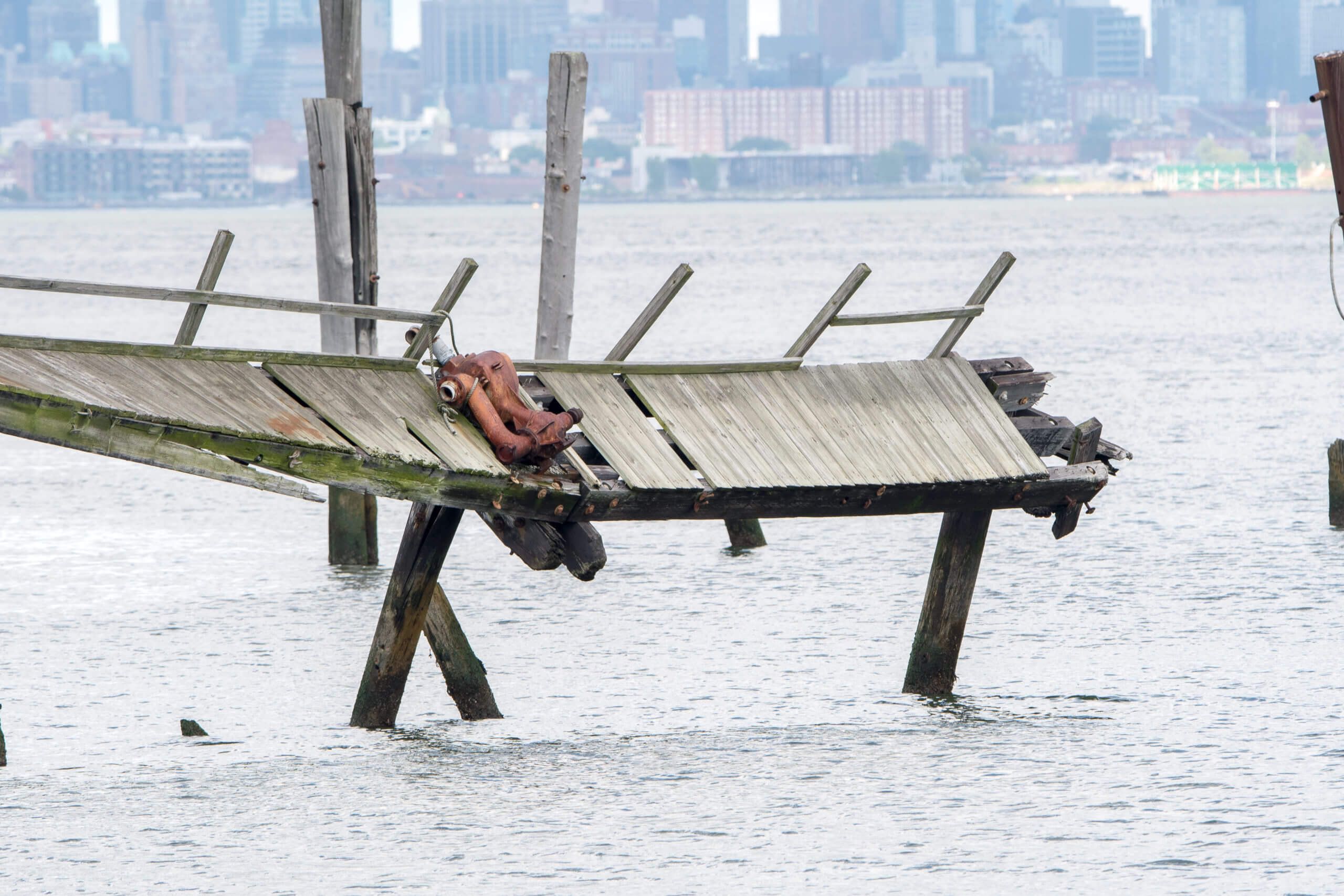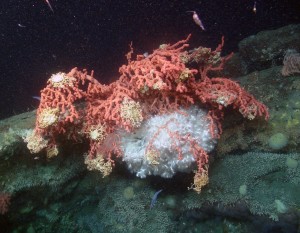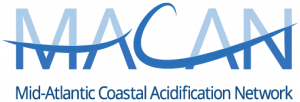SHARED REGIONAL PRIORITIES
Climate Change Adaptation: Improving Ocean Resilience
The Need for Action
The Mid-Atlantic ocean provides commercially, recreationally, and ecologically important resources that support the region’s coastal economies and communities. Coastal states in the region are seeking to understand how a changing climate impacts the ocean so they can plan and adapt accordingly.

- mapping trends in ocean species shifts (fish, avian, marine mammals) based on changes in biological, chemical, and physical conditions. By collecting and disseminating data on our Mid-Atlantic Ocean Data Portal, MARCO is working to present understandable material for public use in the Mid-Atlantic and is also coordinating with partners to ensure that the latest research and information are available.
- developing a better understanding of the processes and consequences associated with estuarine, coastal, and ocean acidification. Through the Mid-Atlantic Coastal Acidification Network, MARCO is working to establish a network of monitoring stations across the Mid-Atlantic and identify research needs to inform local adaptation strategies, and enable communities and industries to better prepare and adapt.
Work Groups/Collaborative Efforts
MARCO and MACO collaborate with governmental agencies, tribal nations and many other interested stakeholders through a series of specially focused work groups. The areas of focus that are relevant to this priority include:

Ocean Data Mapping Team (OMDT)
The Portal is regularly updated with new and improved data and functions. Some features include:
- Socioeconomic data from the Climate Change Vulnerabilities in the Coastal Mid-Atlantic Region
- Sea surface temperature can now be viewed month by month, a feature that was developed in partnership with the Mid-Atlantic Regional Association Coastal Ocean Observing System (MARACOOS)
Significant Projects Completed by MARCO
New Perspectives on the Ocean Economy of the Mid-Atlantic States (December 2022)
This project calculated the contributions of oft-overlooked sectors to the ocean economy such as marine research and education, state expenditures related to the ocean, and coastal electricity production as a baseline for the addition of clean, renewable energy sources, primarily offshore wind. The analysis used a new approach to estimate the value of peak summer tourism with greater precision than standard government measures, and for the first time attempted to place an economic value on the region’s “blue carbon” – the ability of marine plants to store carbon that would otherwise be released to the atmosphere and exacerbate climate change. The report provides regional and state-by-state summaries of the economic impacts of each of these sectors along with six others (marine construction, living resources, offshore mineral extraction, ship and boat building, tourism and recreation, and marine transportation) that have long been tracked by the National Oceanic and Atmospheric Administration’s (NOAA) in its Economics National Ocean Watch (ENOW) data.
Climate Change Vulnerabilities in the Coastal Mid-Atlantic Region (May 2018)
This project aimed to understand how a changing climate impacts our ocean and the Mid-Atlantic’s diverse marine ecosystems, coastal communities and economies. The project examined the implications for resilience of current trends, including increased acidification of coastal and ocean waters, the availability of offshore sand resources and shifting marine life habitats. The project was a collaboration of the Mid-Atlantic Regional Council on the Ocean (MARCO) and the Monmouth University Urban Coast Institute (UCI), made possible by a grant from the National Oceanic and Atmospheric Administration.
Improved Use and Understanding of NNBF in the Mid-Atlantic (March 2017)
The impacts of climate change are already being felt in the Mid-Atlantic region. Coastal communities and habitats are threatened by sea level rise and an increasing frequency and severity of strong storms. Traditionally, gray infrastructure like seawalls and bulkheads have been used to protect coasts; however, these approaches disrupt intact ecological systems and exacerbate damage along adjacent shorelines. As a result, Natural and Nature-Based Features (NNBF) are increasingly being explored as a means of adapting to climate change while also providing numerous economic, ecological, and societal co-benefits that are not derived from traditional gray infrastructure. While significant work has been done at the state and local level across the region, coordinated regional approaches to NNBF are still nascent. To move the entire Mid-Atlantic NNBF community forward towards wider and more informed implementation of NNBF, MARCO sought to answer the most pressing questions concerning their use, and to facilitate collaboration amongst practitioners across organizations and geographies. Funding for this project was provided by MARCO under an award from the U.S. Department of Interior through the North Atlantic Landscape Conservation Cooperative.
One outcome of this report was an expert-panel discussion and follow-up report regarding a framework for citizen science monitoring of NNBF projects in the region: Working Towards a Robust Monitoring Framework for Natural and Nature-Based Features in the Mid-Atlantic Using Citizen Science (July 2017)
Developing Wetland Restoration Priorities for Climate Risk Reduction and Resilience (December 2016)
This report examines the current state of practice for identifying and prioritizing wetlands for their usefulness in climate risk reduction and climate resilience. It is intended to identify promising paths to advance current practice and to improve implementation of strategies across the coastal states of the Mid-Atlantic Region. These strategies are designed to achieve regional protection of human communities and maintenance of ecological functions over the coming century of climate change impacts. Funding for this project was provided by MARCO under an award from the U.S. Department of Interior through the North Atlantic Landscape Conservation Cooperative.
Advancing Preparedness of Climate Change Impacts on Coastal Communities in the Mid-Atlantic (March 2016)
In 2015, MARCO’s Climate Change Adaptation Team’s (CCAT) performed an assessment of regional assets within MARCO’s geographic boundaries in order to gauge how these may be affected by climate change. The four assets – beaches, nearshore habitat, offshore habitat and marine terminals – were selected based on an analysis of MARCO’s mission priorities, geographic scope of governance, and potential transboundary impacts. A research team, including members of Rutgers University, Georgetown Climate Center and Monmouth University, worked with the CCAT to categorize trans-boundary impacts (i.e. where climate change impacts on assets have the potential to create effects across two or more state boundaries) in three ways: economic impacts, ecological impacts, and social/cultural impacts. The resulting report provides the results of the assessment and serves as a guiding document as MARCO continues to develop its climate change adaptation priorities and strategic approach. Funding for this project was provided by MARCO under award number NA13NOS4730110 from the National Oceanic and Atmospheric Administration Office for Coastal Management.
Looking for some quick reads on ocean-related resilience? Check out these MARCO fact sheets:
- MACAN Fact Sheet (April 2018)
- Shifting Species Fact Sheet (April 2018)
- Mid-Atlantic Economic Vulnerability Fact Sheet (April 2018)

